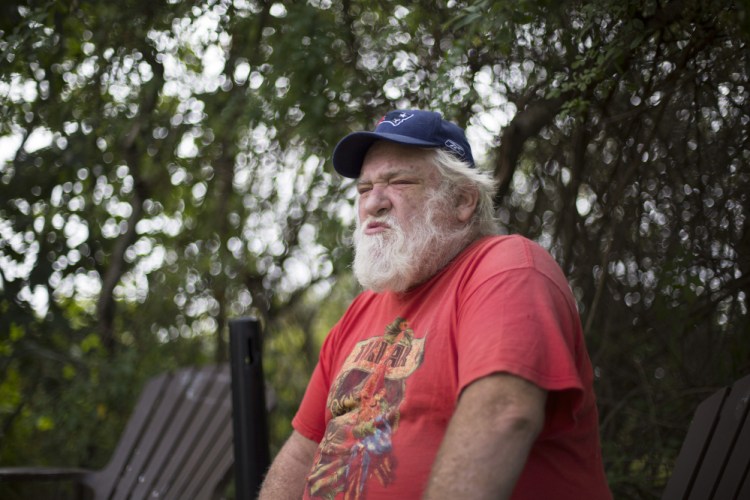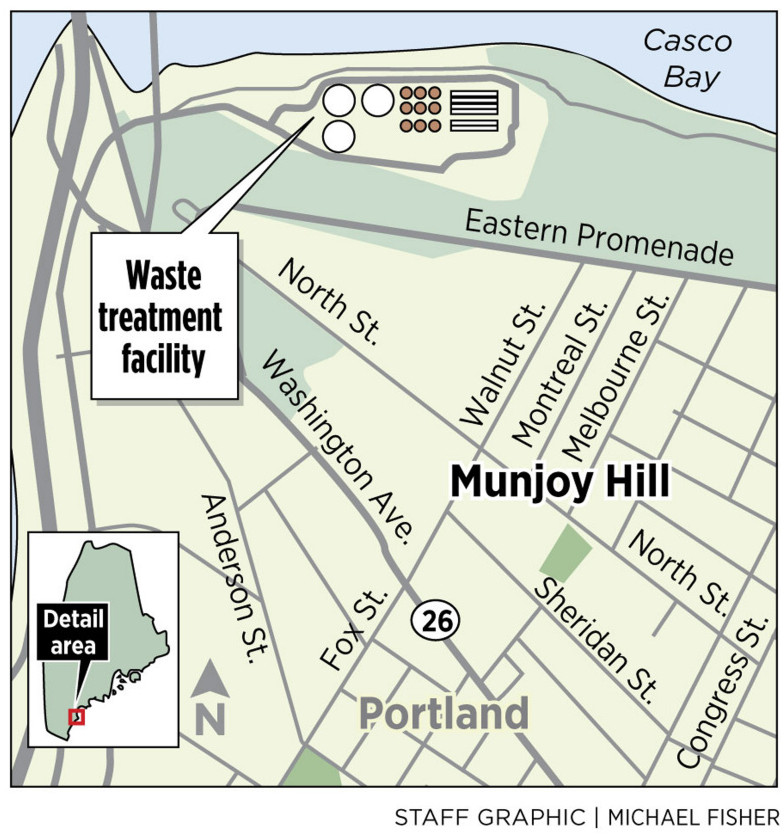For months, residents of Munjoy Hill have contended with a persistent stench wafting from the city’s main sewage treatment plant in the East End.
People have resorted to sleeping through hot summer nights with the windows firmly shut. Others have opted to spend free time in other parts of the city to escape the noxious fumes.
And while relief is on the way, the Portland Water District won’t be able to resolve the problem until next year.
“Every day, it’s awful,” said Kyle Hardy, a Merrill Street resident. “Especially during the evenings, it’s bad news. Very, very potent.”
The water district says the smell can be blamed on an $11.4 million upgrade to the treatment plant’s aging aeration system. The system pumps air into wastewater, producing bacteria that eat pollution and emit odorless carbon dioxide.
But the 36-year-old system has trouble getting enough oxygen into the tanks, so bacteria continue to devour waste, but emit noxious gases such as hydrogen sulfide, said Scott Firmin, director of wastewater services.
The plant is also running at reduced capacity. Normally, it has three aeration tanks to handle wastewater. Currently, the treatment plant is running one new tank installed in August and one old tank.

Inadequate aeration of sewage in open tanks at the East End Wastewater Treatment Plant coincided with the year’s warmest and most humid months. Finishing an $11.4 million upgrade is the only way to control the odors that have plagued many Portland residents this summer, says the Portland Water District’s director of wastewater services.
The third tank is offline while contractors finish construction of a replacement. At reduced capacity, the facility has a hard time dealing with normal increases in flow.
“If we had three tanks on right now, we wouldn’t be getting odors on this level,” Firmin said.
The district is directing as much sewage flow into the new tank as possible and will install extra aeration equipment on the old tank next week in an effort to control the smell.
But finishing the upgrade is the only way to control the odors, Firmin said. The district’s contractors expect the second new tank to be complete by December, and intend to work through the winter to have the third online by next spring, Firmin said.
“I know to somebody concerned about odor, that seems like a long time,” he said. “I assure you we are doing everything, our engineer is doing everything, our contractor is doing everything, to keep this project moving along while doing it properly.”
SPIKE IN COMPLAINTS
The water district has received 83 odor complaints since mid-June. It received only 25 complaints in the same period last year, according to water district figures. This summer’s complaints spiked at the end of July and in early August. Complaints rolled in again in mid-August, when one of the tanks was drained and solids were removed, Firmin said.
And complaints have surged again in the past two weeks, without a clear explanation. There were 16 complaints to the water district last week and more than a dozen submitted to the city of Portland’s online complaint service. A number of factors, including humidity, high temperatures and changes in wind direction, can exacerbate odors, but Firmin said he isn’t sure exactly what’s to blame for the recent problem.
“For some reason, in the last week or so, we’re getting an uptick in the number of complaints and I’ve noticed an increase of odors,” Firmin said.
There was no hint of stench in the air Thursday afternoon on Munjoy Hill, although residents doubted the relief would last long. Many weren’t even sure where it was coming from, or if it was a permanent part of the neighborhood.
Once known as a rough, working-class neighborhood, Munjoy Hill has become one of Portland’s most desirable places to live. That has coincided with new condominium developments, expensive home restoration projects and soaring rents.
Andrew Crust moved to Portland’s East End from Montreal two weeks ago, and the smell was one of the first things he noticed. It hasn’t ruined his time in the city, but it did make him wonder about his new home.
“I wondered, is that a normal smell?” he said.
This isn’t the first time the wastewater treatment plant has produced offensive smells in the neighborhood. In 2012, the water district hired a consultant to examine odor at the plant after a wave of complaints that summer. But based on the volume of complaints, this might be one of the smelliest summers in recent memory.
John Harvey, who lives in Munjoy Commons, thought the smell this year was something unique.
“At first I thought, ‘What went in Back Bay and died?’ ” Harvey said. There have been times when he’s woken up in the middle of the night because of the smell invading his bedroom.
“When the wind blows the right way, the next thing you know the whole apartment smells,” he said.
He’s also frustrated with the pace of progress at the plant, and said the water district’s contractors should be working faster to get it fixed.
AT THE WIND’S MERCY
According to residents, the smell comes and goes. It can be intolerable for a day or two, then ease, only to come back with a vengeance when the wind changes.
Brandon Sweeney and Brittany Buotte said they, like the rest of the neighborhood, have been dealing with the smell all summer, but it has gotten worse in the past two weeks.
“I’ve had to close my windows at night,” Sweeney said. “We expect the smell of saltwater, ocean, and we get this.”
It seems wherever he goes in the neighborhood, the smell is bad, Sweeney said. He’s taken to spending a lot of time away from the hill to escape it.
Buotte, who lives on the West End of the city, said she notices the stench every time she comes to Munjoy Hill. “You can almost taste it,” she said.
Despite the problem, Sweeney is not thinking about moving out. “As long as they are working on it, that’s fine with me,” he said.
Kristi Zarrilli moved into her Melbourne Street apartment in July, and noticed the reek immediately. “It is horrible, it’s not something you can sit comfortably with,” she said.
Still, considering everything else Munjoy Hill has going for it, Zarrilli is willing to deal with some smelly nights and just hopes someone fixes the problem.
“I like Portland too much to leave. Everything is perfect, minus the smell you get,” she said.
Correction: This story was updated at 8:55 a.m. on Friday, Sept. 9, 2016, to correct the type of gas emitted by wastewater.
Send questions/comments to the editors.





Success. Please wait for the page to reload. If the page does not reload within 5 seconds, please refresh the page.
Enter your email and password to access comments.
Hi, to comment on stories you must . This profile is in addition to your subscription and website login.
Already have a commenting profile? .
Invalid username/password.
Please check your email to confirm and complete your registration.
Only subscribers are eligible to post comments. Please subscribe or login first for digital access. Here’s why.
Use the form below to reset your password. When you've submitted your account email, we will send an email with a reset code.